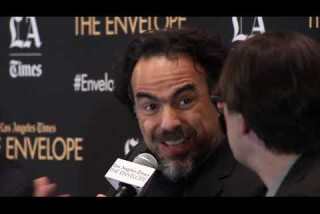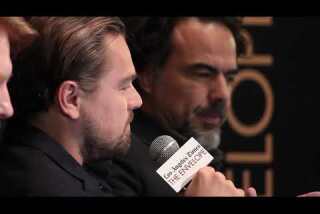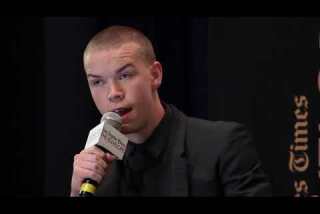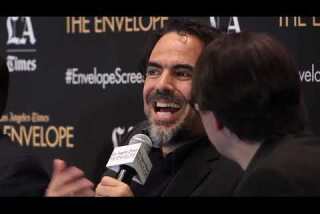Why the Oscars keep disqualifying Alejandro Iñárritu’s movies from the original score competition
- Share via
The urgent request came in May for composer Ryuichi Sakamoto. Could he fly to Los Angeles — tomorrow, if possible — to meet with Alejandro G. Iñárritu? The director wanted Sakamoto to create the score for “The Revenant,” his 19th-century wilderness epic.
The acclaimed Japanese composer was recovering from throat cancer. “I was afraid the stress of doing this film would cause the cancer to return,” he said in a recent interview. But ... “I knew I had to do it because working with Alejandro may only happen once in my life,” Sakamoto said.
So began a labyrinthine scoring process that would eventually yield one of the year’s most complex and avant-garde soundtracks — and a thorny Oscars conundrum.
OSCARS 2016: Full coverage | Complete list of nominees | #OscarsSoWhite controversy | Awkward Oscar moments | Oscars quiz | Awards season database | Top nominee photos | Ballot
“The Revenant,” which stars Leonardo DiCaprio as a frontiersman who is set on revenge after being left for dead, has received 12 Oscar nominations, more than any other movie this year, but original score was not among them. The academy disqualified the score from consideration, partly because it layers other composers’ work and existing music on top of the new compositions. The decision has rankled some of those who worked on the project.
In separate interviews, by phone and email, they discussed their confusion over the disqualification while also revealing how Iñárritu pieced together the movie’s haunting sonic puzzle.
At first, Sakamoto intended to write the entire score for “The Revenant.” He penned the movie’s main theme — a series of plaintive, melancholy chords — but as post-production proceeded, it became clear that he would need help on a film whose running time exceeds 2 1/2 hours.
Watch Q&As with the ‘The Revenant’ cast and crew


Video: 'The Revenant': Limited shooting hours

'The Revenant': Attraction of the story

Video: 'The Revenant': Know what you're getting into

'The Revenant': Knowing a character's future

'The Revenant': Conditions affect performance

Video: 'The Revenant': The bear scene

'The Revenant': Agility of the story
“Alejandro was often asking for more layers of electronic and acoustic sounds woven together, which is a little unusual, a bit experimental,” recalled the 64-year-old composer, whose music Iñárritu had included a decade ago in the soundtrack for “Babel.”
The filmmaker ended up bringing on two other composers to share the burden of creating the movie’s vast soundscapes.
“It all happened fast, but it was a very dedicated time,” said Carsten Nicolai, the German electronic composer credited in the movie by his stage name, Alva Noto.
Iñárritu had used some of Nicolai’s existing music on the movie’s temp track, essentially as place holders. “So my sound aesthetic was in the movie already,” Nicolai said. “Instead of asking someone else to redo it, they called on me.”
Much of his work on “The Revenant” involved creating abstract sounds — “a tone or a noise, very short, 30 seconds here or there. ... I got a lot of tasks like that.”
Nicolai began work on “The Revenant” in September, collaborating with Sakamoto in a studio at Capitol Records. They had previously worked together on several albums ranging from bossa nova to experimental works.
Around the same time, Iñárritu hired Bryce Dessner to create additional music. Iñárritu had attended a Los Angeles Philharmonic concert at Walt Disney Concert Hall that included Dessner’s new piece, “Quilting.” (Iñárritu is a friend of L.A. Phil Music Director Gustavo Dudamel.)
“By the time I was asked, they were still shooting the final scenes,” recalled the composer, who is American but is based mostly in Paris.
“Alejandro is so musical. The sound for him is as important for him as anything else, if not more,” Dessner continued. “There’s a collage effect at times, in the way it interacts with the sound of nature.”
As part of the collage, Dessner said he created new orchestral music while also adapting some of his preexisting pieces. The climactic showdown between DiCaprio and Tom Hardy features elements of his “Lachrimae,” a 2012 piece for string orchestra.
The score for “The Revenant” was recorded piecemeal in three cities: Sakamoto conducted his portion with the Northwest Sinfonia, a popular soundtrack recording ensemble in Seattle; Dessner recorded in Berlin; and Nicolai created his music in L.A., where all of the score was eventually mixed.
Some parts of the score combine music from two or all three composers, their tracks intermingled. To further complicate matters, Iñárritu supplemented the score with excerpts of existing work by a few new music luminaries including John Luther Adams and Olivier Messiaen.
The movie’s first big battle scene, in which fur trappers come under a surprise Indian attack, crescendos to the churning harmonies of Adams’ “Become Ocean,” a symphonic work that won the Pulitzer Prize in 2014. (The recording used in the movie was performed by the Seattle Symphony, which commissioned the piece.)
The soundtrack also features previously existing music by Sakamoto, including selections from his 2010 nature-themed album “Out of Noise.”
“Alejandro had been using a few of my existing pieces as temp music during his process,” Sakamoto said. “In the end some pieces we replaced, but some worked so well he wanted to keep them.”
In December, the academy’s music branch rejected “The Revenant” for eligibility in the original score category. Iñárritu, along with Sakamoto and Nicolai, wrote letters of appeal, arguing that the vast majority of the soundtrack is original material.
The music branch’s executive committee discussed the movie “at length” and even screened the film with cue sheets in hand so that members could “determine who wrote what,” said Charles Fox, who is a head of the branch, in a statement sent to The Times.
In the end, he said, the committee determined that the music from different sources, including licensed tracks, “made it impossible for audience members to tell whose music they were listening to.”
Fox said the licensed music “contributed greatly to the overall design and effectiveness of the musical score.”
The academy’s rules state: “Scores diluted by the use of tracked themes or other preexisting music, diminished in impact by the predominant use of songs, or assembled from the music of more than one composer shall not be eligible.”
“Of course I respect their decision,” said Sakamoto, who is a past Oscar winner for his work on “The Last Emperor” in 1987. “However, I suspect it would benefit them as an institution to rethink some of their perhaps antiquated rules.”
Nicolai said the academy’s rules are vague and confusing. The organization has “an old-fashioned idea of what is a score. … They should make [clearer] rules and really stick to it, or they should say, ‘let’s keep it flexible.’”
See more of Entertainment’s top stories on Facebook >>
He added, “Alejandro was really, really angry.”
Understandably so: Last year, the academy disqualified the soundtrack to Iñárritu’s best picture winner, “Birdman,” on the grounds that the percussion-heavy score by Antonio Sanchez was supplemented by classical music cues.
Iñárritu also appealed that decision and lost. (The director could not be reached for comment.)
Past disqualifications in the category include Nino Rota’s famous score for “The Godfather.” The composer’s nomination was rescinded because he had rehashed his music from the 1958 movie “Fortunella.”
“The Revenant” score received Golden Globe and BAFTA nominations following the Oscars disqualification. Sakamoto hopes the soundtrack will eventually be judged on its own merits.
“I like to write film music that stands on its own,” he said, explaining that even without the film, “it is still a complete body of work, strong enough to have its own life.”
MORE:
Review: ‘The Revenant’ is a survival tale of beautiful, brute strength
‘The Revenant’s’ adventures weren’t all on-screen
Domhnall Gleeson, on playing gentle and evil and surviving the harsh shoot for ‘The Revenant’
More to Read
Only good movies
Get the Indie Focus newsletter, Mark Olsen's weekly guide to the world of cinema.
You may occasionally receive promotional content from the Los Angeles Times.











